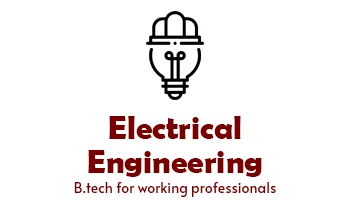Apply For B.Tech for Working Professionals In Electrical Engineering

B.Tech for Working Professionals In Electrical Engineering
Listen Podcast

About B.Tech for Working Professionals in Electrical Engineering
Electrical Engineering is a leader in engineering innovation and change. B.Tech degrees in Electrical Engineering provide several opportunities for working individuals looking to further their careers. This specialised sector powers our technological advances, from power production and distribution to cutting-edge electronics and telecommunications.
Let's discuss the other required information about the program:
Key Features of B.Tech For Working Professional
- The B.Tech in Electrical Engineering for working professionals is accessible since it allows you to manage work and personal obligations.
- This curriculum emphasises hands-on experience and practical applications to provide you with workplace-relevant skills.
- Unlike standard B.Tech degrees, this program lets you specialise in power systems, electronics, or renewable energy.
- You'll keep up with electrical engineering advances with a program that matches industry needs.
- These B. Tech degrees may lead to higher-paying jobs and professional growth in the ever-changing area of electrical engineering.
Subjects/Syllabus
Electrical Engineering encompasses the study of electrical systems, electronics, and electromagnetism. It focuses on designing, analysing, and optimising electrical circuits and systems, powering our modern world and driving innovation in telecommunications, energy, and electronic
Application Criteria
Eligibility criteria for a B.Tech in Electrical Engineering for working professionals typically include:
Educational Qualifications: The individual should have a diploma or bachelor's degree (UG) in Electrical Engineering or a similar profession.
Work Experience: One to three years of similar job experience are usually needed to ensure candidates have practical expertise.
Entrance Examinations: Many institutions require candidates to clear specific entrance exams or assessments designed to evaluate their aptitude and knowledge in electrical engineering.
Course Duration
The average B.Tech in Electrical Engineering lasts four years. Eight six-month semesters make up these four years. Students study fundamental engineering concepts, mathematics, electronics, power systems, control systems, and more throughout this time. They obtain practical experience and theoretical understanding via lab work, projects, and internships.
Admission Process
The B.Tech Electrical Engineering admissions process usually contains multiple steps:
- Eligibility Criteria: You must have a diploma or bachelor's degree (UG) in a necessary discipline and a minimum percentage or GPA.
- Admission Examination: Many colleges need students to take JEE, GATE, or institution-specific examinations. Passing these examinations is essential for admission.
- Application Submission: Include academic transcripts, certificates, and identity evidence in the institution's application form.
- Counselling/Interview: Some colleges undertake counselling or interviews to determine program appropriateness.
- Merit List: Institutions compile a merit list based on admission test results, academic achievement, and other factors.
- Seat Allotment: A merit list ranking determines program seats for successful applicants.
Fees Details
Electrical Engineering for working professionals can cost less than a regular B.Tech degree. The fee can vary as per specialisation as follows:
Specialisation
B.Tech for working professionals is available in varied specialisations that you can opt for. Depending on your diploma, you can choose from some specialisations: Civil Engineering: Electrical Engineering and Civil Engineering share several infrastructure design and construction tasks. Many people specialise in Building Services Engineering, which develops and executes electrical systems, including lighting, HVAC, and fire protection. Electrical energy generation, transmission, and distribution need Power Systems Engineering for large projects like power plants and substations. Control processes Engineering combines traffic management and industrial operations to automate and control processes.
Mechanical Engineering: Electrical and Mechanical Engineering are independent disciplines, yet there are areas of speciality where they overlap and provide cross-disciplinary experience. Mechatronics, Robotics, and Automation are Mechanical Engineer specialties in Electrical Engineering. Automating operations using electrical and mechanical technologies improves efficiency and reduces human interaction. Mechanical Engineers are sought after in technology-driven sectors because they can work on cutting-edge projects that combine both areas' concepts.
Computer Science Engineering: While Computer Science Engineering and Electrical Engineering are independent sciences, they overlap in specific areas that provide unique integration potential. Embedded Systems and IoT (Internet of Things) integrate hardware and software development for computer devices. Power Electronics and Drives converts and controls electrical power for renewable energy and electric cars.
Electronics and Communication Engineering: This Electrical Engineering specialty contains numerous specialities. VLSI Design focuses on ICs and microchips; Control Systems oversee automated operations; Signal Processing manipulates signals for image and voice processing, and Telecommunications conveys information across large distances. Instrumentation and Measurement provide accurate measurement and control systems, whereas Power Electronics converts and regulates electrical power.
Automobile Engineering: Advanced Electrical Engineering for Automobile Engineering specialties design, develop, and optimise electrical systems. Power Electronics engineers develop EV propulsion, battery management, and charging infrastructure. Control Systems professionals develop car stability control, autonomous driving, and ADAS software. Automotive Embedded Systems improve vehicle connectivity and functioning via software and hardware.
Career Opportunities
Electrical engineers working professionally have several career options across businesses and areas. Popular career pathways and employment prospects include
Electrical Engineer: Profession as an electrical engineer in power generation, transmission and distribution, electronics manufacturing, or telecommunications. This role involves designing, testing, and maintaining electrical systems and equipment.
Control Systems Engineer: Specialising in control systems, these professionals design and implement automated control systems in manufacturing, robotics, and process industries.
Power Systems Engineer: Focusing on the design and operation of power systems, these engineers work in the energy sector, ensuring the efficient generation, distribution, and utilisation of electrical power.
Renewable Energy Specialist: With the growing emphasis on sustainability, professionals in this role design and implement renewable energy systems like solar and wind power.
Top Hiring Firms
MNCs and huge enterprises worldwide recruit engineers for diverse jobs. Niche businesses demand various engineering specialisations. Here are the top engineering recruiters worldwide by specialisation:
Civil Engineering
- Larsen & Toubro
- AECOM
- Mott MacDonald
- Atkins
- Skanska
- Vinci
- Arcadis
- NCC limited
Mode of Classes to Opt
There are customisable scheduling options for working B.Tech students. Some institutions and organisations need full-time professionals for online or distance B.Tech programs. We will analyse the two primary scheduling options for working B.Tech students:
Weekend Classes:
Weekend sessions are ideal for professionals with full-time jobs. This model lets people work while getting their B.Tech. Weekend sessions are mostly offered on Saturdays and Sundays.
Evening Classes:
Working professionals may also take B.Tech courses in the evening. This option lets people work during the day and take lessons at night. Evening classes are generally held after work.
Holiday Classes:
Some institutions and organisations offer B.Tech programs with vacation schedules and weekend and evening courses. These holiday courses help working people with extra time during holidays. Students may learn throughout holidays via holiday classes.
Top Universities
Here's a chart of prominent colleges providing B.Tech degrees in Electrical Engineering for working professionals and their accreditation:
What Are The Reasons For Choosing B.Tech?
As a working professional, studying B.Tech in Electrical Engineering may boost employment chances, open new doors, and help one develop personally and professionally. Why working while obtaining a B.Tech in Electrical Engineering is worthwhile:
Job advancement: A B.Tech may increase your job opportunities. A B.Tech in Electrical Engineering may lead to higher-paying jobs, promotions, and leadership responsibilities in your current or other business. Many companies respect technical expertise.
Industry Relevance: Electrical engineering is used in energy, electronics, telecommunications, and manufacturing. A B.Tech in this profession establishes you as an expert in a relevant sector, guaranteeing job security and career stability.
Global Opportunities: B.Tech talents and expertise are acknowledged internationally. This allows you to explore worldwide career potential via overseas projects, partnerships, and work placements.
Why Should You Opt For An Education Loan?
As a working professional, taking out an education loan to study electrical engineering for a B.Tech may reduce the financial load of college. Education loans cover tuition, books, and other costs. This financial assistance helps working professionals pay for their B.Tech degree without emptying their funds or disturbing their routine.
Conclusion
As demand rises, working individuals are more interested in enrolling in a B.Tech degree in electrical engineering. It offers flexible learning choices for professionals' backgrounds and schedules, including full-time jobs and personal obligations. This curriculum improves professionals' knowledge and problem-solving skills for today's complicated engineering context.
Mentors
When Wisdom meets Ambition
Unlock the potential to shape your academic and career success with apposite experts advice.
5+
Mentors
50+
Universities
5k+
Counsellings
1M+
Students
Chart Your Course with Expert Counsel
Schedule your 30 mins counseling session with an expert
Unanswered questions weighing on your mind?
Expert advice on demand, get one in no time.

